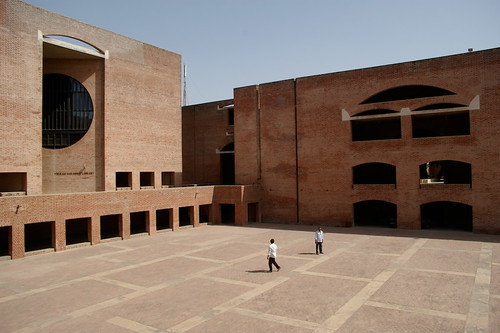Business Guru predicts future Indian Buzzwords
April 30, 2010 6 Comments
This whole business of picking shady old Indian concepts, and then presenting them as hi-funda new business buzzwords really has legs! If Jugaad can become a buzzword (see my previous post), why should other old desi concepts be left behind? What other borderline-morally-reprehensible activities will now be rebranded as business insight? We asked the experts.
2M1B invited the very famous desi Business Guru, Professor Gaurav Rastogi, to talk to us about other ideas that are likely to become global business buzzwords.
Hafta, (liteally, “weekly”) used to refer to the protection racket that local businessmen and beggers (see, Slumdog Millionaire) were subjected to. Prof. Rastogi says, “Time has come for this c0ncept of weekly payments of ‘insurance’ premiums to go global. The Indian merchant is used to paying a weekly insurance premium to the local insurance agent, who insures the merchant against vandalism and other ‘acts of goons’. This concept of mutual insurance protected entire markets, and provided the social cover that was needed to run businesses smoothly. We have seen businesses as far as the middle east and Africa asking us for advice on how to start their own hafta collections. This is the latest innovation from the Indian subcontinent after micro-credit and, in fact, much better for the society at large”.
Timepass, is the old desi tradition of whiling away time watching the cows chew cud, or watching dung dry, whichever is slower. Prof Rastogi says, “Modern society has put a high premium on time. No one seems to have time anymore. We are very busy getting to work, on conference calls and doing email. The society needs an outlet. The traditional Indian practice of timepass brings home the point of pointlessness. The expert timepass practitioner can spend weeks without the need to do something mildly active, like changing the channel on their television, or changing the sand in their spittoon. Western society has much to learn from this ancient Indian tradition. We have done many 4-week seminars with Fortune 500 boards, showing them the power of no-action. Here, have some unshelled peanuts…”.
Chalta hai, (literally, let it go) is the Indian tradition of letting things happen with minimal intervention or protest. Internet service down? Relax, chalta hai! Death certificate will take 3 weeks? Take a chill pill, because Chalta Hai! Chief Minister stuffing billions into their swiss account? It’s OK Chief, Chalta hai! Prof. Rastogi says, “The oriental mind is more accepting of the situation, and this attitude of acceptance and forgiveness is exemplified in Chalta Hai! This attitude allows nature to work it’s course, and the eventual outcome is almost always the same. Why do something, when doing nothing will achieve the same result? For years, Japanese companies have been secretly visiting India and making videos of the legendary Indian worker practicing Chalta Hai. Toyota attributes much of their success with brake pads and fantastic auto acceleration to their recent lessons in this ancient Indian practice”.
Prof. Rastogi invites 2M1B readers to contribute their stories about famous Indian management practices that may have been given a bad name because of 2 centuries of oppressive British rule.

Comments